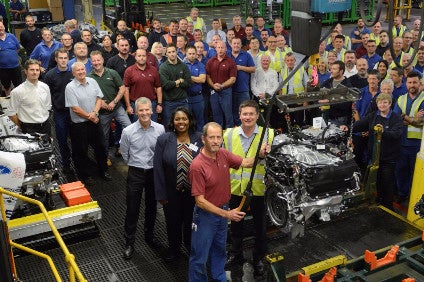
Ford on Thursday confirmed the closure of the Bridgend engine plant in South Wales in 2020.
Sky News, at the plant gates, reported layoffs at the site had begun immediately.

Discover B2B Marketing That Performs
Combine business intelligence and editorial excellence to reach engaged professionals across 36 leading media platforms.
The plant opened in 1977 and employs around 1,700 people including nearly 400 who signed up to a voluntary separation programme earlier this year and will leave between May and December 2019.
Ford said factors behind the proposed closure of Bridgend include significant underutilisation of the plant, driven by the impending end of engine production for Jaguar Land Rover, the cessation of the previous generation Ford GTDi 1.5-litre engine, and reduced global demand for the new generation GTDi and Pfi 1.5-litre engine.
"At expected volumes, the plant also faces a cost disadvantage compared with other Ford facilities building the same engine. Significant efforts to identify new opportunities have not been successful. It is proposed that production of the new generation 1.5-litre engine will end at the Bridgend facility in February 2020, with manufacture of the engines supplied to Jaguar Land Rover ceasing in September 2020, when it is proposed that Bridgend will close."
The automaker added the proposed axe is a necessary step to support its "global business redesign" and part of strategy to create a more efficient and focused business in Europe.
"Creating a strong and sustainable Ford business in Europe requires us to make some difficult decisions, including the need to scale our global engine manufacturing footprint to best serve our future vehicle portfolio," said Stuart Rowley, president, Ford of Europe.
Sky News said Rowley had denied the decision had anything to do with Brexit and would have been taken regardless.
"We are committed to the UK; however, changing customer demand and cost disadvantages, plus an absence of additional engine models for Bridgend going forward make the plant economically unsustainable in the years ahead."
Ford's so-called "commitment to the UK" has seen the automaker end UK truck production, close Dagenham car production in the early 2000s, sell Halewood to Jaguar Land Rover, end Transit production at Southampton and generally scale down operations across a market where its products are top sellers. So much for the 'build where you sell' strategy of some automakers.
Ford also detailed "an enhanced separation programme" for Bridgend employees. This includes helping with redeployment opportunities to such Ford sites as are left in the UK and assisting with domestic relocation where possible, or supporting them to find new employers or pursue new opportunities, such as creating their own businesses or training for new careers.
"As a major employer in the UK for more than a century, we know that closing Bridgend would be difficult for many of our employees," Rowley said.
"We recognise the effects it would have on their families and the communities where they live and, as a responsible employer, we are proposing a plan that would help to ease the impact."
Ford expects to book pre-tax special item charges of about US$650m in relation to closing Bridgend. About $400m would be paid in cash and are primarily separation and termination payments for employees.
Non-cash charges of approximately $250m include pension expense and accelerated depreciation and amortisation.
Most of the pre-tax special item charges would be recorded in 2019, with the cash outflows occurring in 2020, and are part of the $11bn in EBIT charges with cash-related effects of $7bn the company expects to take in the "redesign" of its global business.
Ford insisted it was "committed to the UK" where it continues to be the passenger and commercial vehicle sales leader.
"Even after the proposed closure of Bridgend, Ford will remain a major employer with significant operations in the country," it said.
These include the Mobility Innovation Office in London and Dunton Technical Centre in Essex which is home to the commercial vehicle business – currently forging an alliance with Volkswagen – which, the automaker claimed, "is set to play an even more significant role in the future".
Ford said it would also continue to produce diesel engines at its Dagenham Engine Plant in east London and transmissions at the Halewood Getrag Ford Transmissions joint venture on Merseyside.
Ford Europe has previously announced ending C-Max/ Grand C-Max production in Saarlouis, Germany, this month; shift reductions in Saarlouis and Valencia, Spain; restructuring the Ford Sollers joint venture in Russia to focus on growing its commercial vehicle business with discontinuation of all passenger vehicle production in June 2019, and the closure of two vehicle assembly factories and one engine plant. Production at the Ford Aquitaine Industries transmission plant in Bordeaux, France, ends in August 2019.
Ford's Bridgend engine plant; the anatomy of its decline






